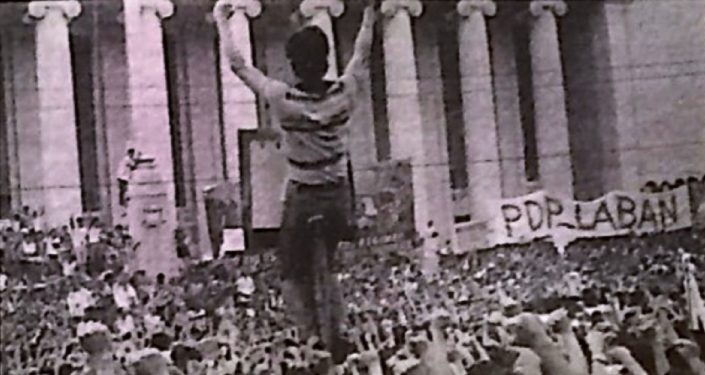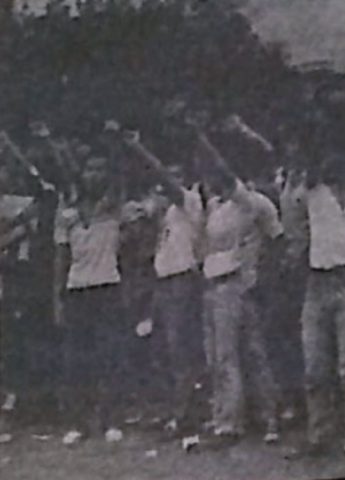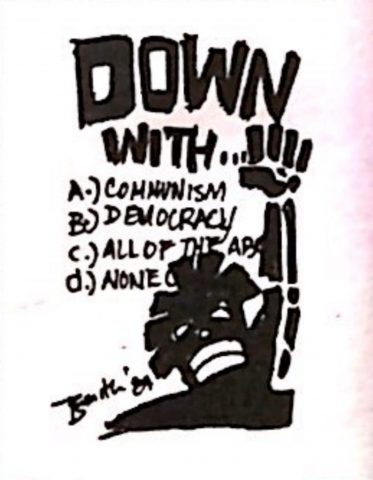Not until recently had I understood why Pope Paul IV said that “it is not peace that we should have at all cost but rather justice.” The events of the past months, however, brought out the wisdom of this papal statement. Peace without justice and based on fear is at most tenuous, whereas justice based on law and reason engenders lasting peace. Pope Paul IV must have referred to the precarious and uneasy peace that reigned in countries under authoritarian rule.

The seemingly peaceful situation which prevailed after the declaration of martial law in 1972 could have continued indefinitely, due largely to a very wide latitude of tolerance among Filipinos. As a people, we endure injustices in silence and, for the sake of peace, we refrain from divisive action. Let us not forget that it took our forefathers 400 years to rise against the Spaniards. It took the death of José Rizal to shake them from their stance of tolerance just as it took the assassination of Benigno Aquino to rouse us from eleven years of political lethargy. As a result, we again witness students taking to the streets to protest against the government.
At the height of student demonstrations in 1970, I delivered a lecture on Herbert Marcuse, the philosopher of student activism. That lecture mutatis mutandis is still relevant today. I would like to underscore the fact that the published lecture was not considered subversive or seditious.
Marcuse spoke of the Great Refusal which is a protest against that which is. It is directed against a given system even if that be a democracy. An established democracy, he said, provides for legitimate changes within reason or within a prescribed framework but no established democracy will provide for its own overthrow. While it is true that a democratic form of government allows the airing of grievances, thus providing a safety valve, it protects itself from radical changes that could subvert its existence. It is therefore clear that in a democracy, freedom of speech is never curtailed for it is precisely free speech that eases tension and prevents violent upheavals.
And yet, in the late 1960’s, the world saw the birth of student activism in established democracies such as France and the United States. Why the need for student activism if people are free to air their grievances in peaceful dialogues?

Marcuse claimed that the old system of protest is outmoded. Forms of government become petrified and tend to clamp down on our freedom by means of controlled media. There ought to be new directions of protest, drastic transvaluation of values, methodical disengagement from, and refusal of, the Establishment. If the approach is different, a new cast of characters is called for. Pre-established leaders would be ineffective; politicians, no matter how left or center, would be useless. Even technocrats would be futile for “technocracy, no matter how pure, streamlines and sustains the continuum of domination.” The initiative must begin from small groups with a high degree of autonomy, mobility and flexibility. Even the working class is no longer a viable source of protest due to vested interests. Catalysts outside its ranks are necessary, and Marcuse believed these to be the students who have nothing to lose because they have nothing at stake. Thus, the rise of student power.
In this connection, Marcuse claimed that a new language is called for, since the Establishment has succeeded in distorting word meanings for its own benefit. David Broder of Los Angeles Times (Oct. 1, 1968) wrote that “the systematic stripping of meaning and substance from words is a form of subversion [sic] not covered by statute…And when words lose their meanings, when the medium overwhelms the message, a system of government like ours may no longer be operable.”
Today, there is a methodical reversal of meaning, a total distortion of word meanings perpetuated by the Establishment. What the enemy does is evil, what he says is propaganda and this, according to Marcuse, is an a priori linguistic defamation. The students who demonstrate are, according to the Establishment, misguided elements, radicals and Communists, but the counter demonstrators are free citizens who simply gather.
In many parts of the world, students were the prime cause of the downfall of tyrannic forms of government. Their protest demonstrations, however, brought untold inconvenience to other segments of society. In answer, Marcuse wrote, “Can one meaningfully call it an offense when demonstrators disrupt the business of the university, the draft board, the supermarket, the flow of traffic to protest against the far more effective disruption of the business of life of untold numbers of human beings by the armed forces of law and order?” Marcuse seemed to condone student militancy but, in truth, he was simply describing a global phenomenon of students dramatically manifesting what the majority of citizens cannot openly espouse. Inconveniencies are, however, inevitable.
Student rebellion hits society at its most vulnerable spot for it affects the very youth who will comprise the society of the future. Marcuse seemed to say, rightly or wrongly, that students have a legitimate right to protest against an errant government if their future is adversely affected.

The prevailing conditions of 1983, however, are different from those of 1970. In 1970, students did not have the support of the silent majority and in that case, Marcuse claimed, they would perpetuate the very system they seek to change. As an example, Marcuse cited the Paris student rebellion against Charles de Gaulle in May 1968. L‘Humanité reported that “every barricade, every car burned gave tens of thousands of votes to the Gaullist party.” But what is just as true is that without the barricades and the cars burned, the Establishment would have been just as safe. Hence, Marcuse continued, student militancy is doomed from the very start. If so, should it be undertaken at all? In the words of Marcuse, “it must take the risk of such a failure if in so doing it can consolidate its strength and expose the banalities of civil obedience to a reactionary regime.”
In the Philippines, however, we observe that we have gone beyond student power. We now have “people power.” This means that in 1983 and beyond, students could have the backing of society to form one solid front.
Marcuse, however, did not touch on “people power” perhaps because history is replete with examples of the power of the people.
